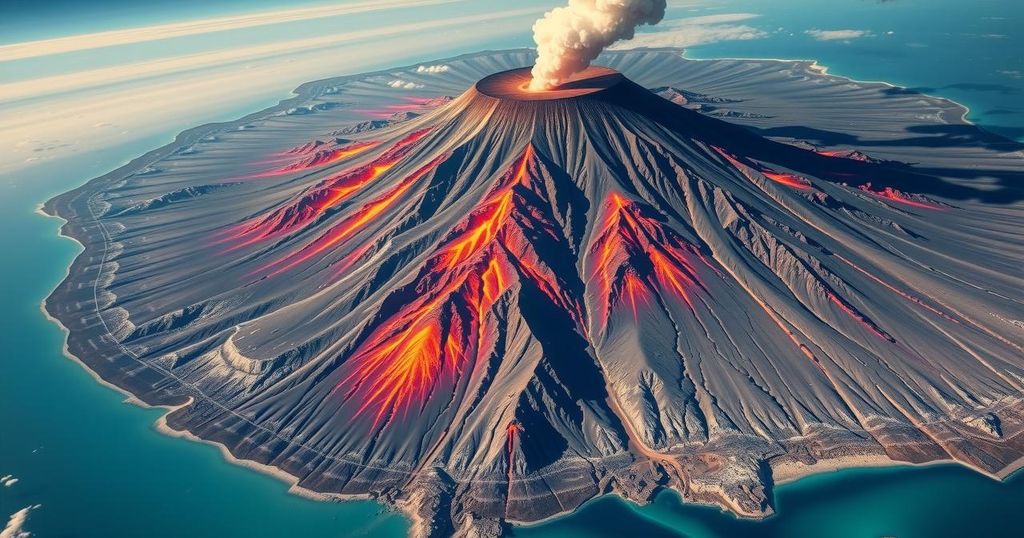Dofan Volcano Shows Signs of Eruption Amid Seismic Activity in Ethiopia
On January 3, 2025, a new vent opened at Dofan volcano in Ethiopia’s Afar region, releasing jets of steam, rocks, and mud. The eruption coincides with escalating seismic activity that began on December 22, 2024, raising concerns about a potential eruption, the first on record for Dofan. Experts warn that magma intrusion beneath the surface may fuel this unrest, impacting local populations within proximity to the volcano.
A significant geological event has occurred at the Dofan volcano in Ethiopia’s Afar region, where a new vent opened on January 3, 2025. This vent has been releasing powerful jets of steam, rocks, and mud, indicating a possible escalation in volcanic activity amidst ongoing seismic unrest that began on December 22, 2024. With the geological history of the Dofan volcano suggesting potential eruptions, experts are closely monitoring the situation. The current activity is associated with magma intrusion beneath the surface, raising concerns about the volcano’s capacity for explosive eruption, which, if it occurs, would mark the first recorded eruption of this geological structure.
The Dofan volcano is situated in the Dulecha district, and its recent vent activity presents a potential hazard to the nearby population. Volcanologist Tom Pfeiffer has noted: “It has erupted frequently from fissures parallel to the rift axis and produced young lava flows and rows of cinder cones.” As seismic activity escalates, local earthquakes have been reported at varying magnitudes, with the largest recorded at 5.1 on December 29, 2024. Despite the geo-scientific interest, the actual number of quakes remains unclear due to the lack of a comprehensive seismic monitoring network in the vicinity.
Furthermore, the Dofan volcano, recognized for its fumarolic activity and sulfur deposits, rises 1,151 meters above sea level within the tectonically active segment of the Main Ethiopian Rift. Historically, this region has been prone to seismic activity, given the divergence between the Nubian and Somali tectonic plates. The proximity of local communities within danger zones underscores the potential risk posed by this geological instability; nearly 1,900 people reside within 5 kilometers of the volcano.
Residents in nearby towns, including Metahara, have reported feeling tremors as the seismic unrest continues, prompting local authorities to prepare for potential evacuations. With more than 2.9 million inhabitants living within a 100 km radius, the Dofan volcano’s ongoing activity is a critical concern for public safety and geological research. The situation is reminiscent of the recent seismic crises observed at the Fentale volcano, reinforcing the need for diligent monitoring and community preparedness in the event of volcanic eruptions in this active region.
Overall, the emergence of the new vent at Dofan is a vital development that reflects the underlying volatility of the area, drawing attention to both the scientific inquiries surrounding volcanic activity and the potential implications for the local populace. As the Earth continues to demonstrate its dynamic nature, research and preparedness will be essential in mitigating the risk of a catastrophic eruption in this densely populated region.
The Dofan volcano, also known as Dofen, resides in the Afar region of Ethiopia and is part of the larger East African Rift System, a region characterized by tectonic activity due to the separation of the Nubian and Somali tectonic plates. This volcanic structure stands at 1,151 meters above sea level and features a complex rift system with numerous cinder cones. The area has history of geological phenomena, including fumarolic activity and sulfur deposits. Recently, seismic activity in the region has intensified, prompting scientists to investigate the potential implications for local communities and the likelihood of a significant eruption, which would be unprecedented for the Dofan volcano.
In conclusion, the emergence of a new vent at Dofan volcano represents a significant geological event, coinciding with a marked increase in seismic activity in the Afar region of Ethiopia. As concerns about a potential volcanic eruption grow, experts are closely examining the situation, recognizing the risks posed to local populations. Historical patterns indicate that the Dofan volcano has the potential for explosive activity, drawing necessary attention to monitoring and preparedness efforts. Given its proximity to densely populated areas, stakeholders must prioritize public safety in the face of this evolving crisis.
Original Source: watchers.news




Post Comment